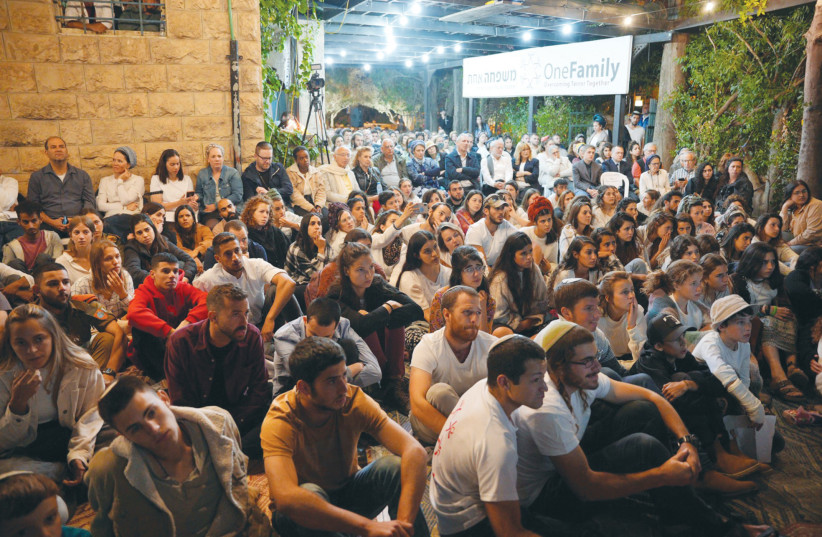Bringing up political differences on Remembrance Day is an unnecessary distraction – editorial
Israel has entered one of its holiest periods – as indelibly linked to the DNA of the country as Yom Kippur and Passover.
Yom Hashoah (Holocaust Remembrance Day), followed by Yom Hazikaron (Remembrance Day) and then immediately by Yom Ha’atzmaut (Independence Day), represents the thread that binds the diverse elements of Israel into a whole – a messy, contrarian and noisy whole, but in its most challenging moments, it can become a cohesive one that defines the country’s beating heart.
In a land so tiny and intertwined, there’s barely a soul among us who doesn’t know somebody who has fallen in one of Israel’s wars or in one of the terrorist attacks that have plagued us since the state’s formation in 1948 and beforehand.
For those families who have lost loved ones, this week is painful and raw, with emotions close to the surface.
This year, those feelings have been exacerbated by the conflict taking place within Israeli society.
 ONE FAMILY holds a ceremony on Remembrance Day, last year in Jerusalem. (credit: ONEFAMILY)
ONE FAMILY holds a ceremony on Remembrance Day, last year in Jerusalem. (credit: ONEFAMILY)Already torn apart for the last three months over the judicial overhaul debate and the massive protests that have engulfed the nation, the citizens of Israel are now letting the acrimony that’s developed seep into the national consensus of Remembrance Day.
A contingent of bereaved families has called on coalition politicians and ministers to stay away from memorial ceremonies at military ceremonies this year. Some are just against having ministers or MKs who did not serve in the IDF participate in the ceremonies, while others are demanding that none of them shows up due to the ongoing debate over the government’s judicial reform.
There were even reports last week that the Shin Bet (Israel Security Agency) is arranging security for the politicians based on how much opposition they are expected to face from bereaved families. Out of 52 memorial ceremonies at military cemeteries, seven were reportedly scheduled to include ministers or MKs who did not serve in the IDF, including National Security Minister Itamar Ben-Gvir, who is scheduled to speak in Beersheba.
As deservedly distraught they may be, the bereaved families cannot determine whether duly elected representatives of the nation’s government attend or speak at these state ceremonies. On the other hand, their feelings must be taken into consideration.
Some politicians understand the situation
It seems like a number of politicians understand this.
Culture and Sports Minister Miki Zohar struck a conciliatory note during a KAN radio interview on Thursday morning, saying that although ministers and MKs have every right to attend the ceremonies like any other citizen, they should weigh the consequences of making speeches if it’s going to create bedlam and turn the solemn day into a brouhaha that would shatter the spirit of the day.
From the opposition, National Unity chairman Benny Gantz also tried to lower the tensions, saying that politicians have a “national duty and responsibility” to attend the ceremonies, but they must be sensitive to bereaved families in the current period of social upheaval.
“We must show extra sensitivity this year and maintain respectful dialogue that honors the memory of the fallen [soldiers], and only it, [and] to attempt to attend, coalition alongside opposition, to show that we are all unified on this day,” Gantz said.
“I respect the bereaved families who criticize us,” he said. “I accept everything they say with love and embrace them. Each and every one of them has a place in all of our hearts. Nonetheless, we all need to enter the [military] cemeteries with personal and national grief and leave the public dispute aside, if only for one day.”
“We must show extra sensitivity this year and maintain respectful dialogue that honors the memory of the fallen [soldiers], and only it, [and] to attempt to attend, coalition alongside opposition, to show that we are all unified on this day.”
Benny Gantz
Regardless of families’ motives for opposing the participation of elected officials in memorial ceremonies, there’s no denying that politics have infected one of the few remaining unifying symbols in Israeli society.
It must stop. Bringing petty political differences into the cemeteries where those who lost their lives defending the Jewish state are interred serves only to cheapen their memory and further implant a spike of division among all of those mourning lost family members.
It does nothing to ease the pain and is an unnecessary distraction on a day when the nation collectively should be focused on the immense loss it continues to endure to this day. Only that approach can provide the hope of some solace and fortify our resolve to face the future.





Comments are closed.